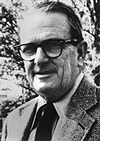
NOBEL THOUGHTS: Allan Cormack
Profound Insights of the Laureates
 Allan Cormack was University Professor at Tufts University. In 1979 he
was awarded a Nobel Prize in physiology or medicine for his work in developing
the mathematical and physical foundations of computerized axial tomography,
the x-ray imaging of soft tissues or layers of tissue of differing densities.
This interview was conducted in 1992. Professor Cormack died in 1998.
Allan Cormack was University Professor at Tufts University. In 1979 he
was awarded a Nobel Prize in physiology or medicine for his work in developing
the mathematical and physical foundations of computerized axial tomography,
the x-ray imaging of soft tissues or layers of tissue of differing densities.
This interview was conducted in 1992. Professor Cormack died in 1998.
A. I've frequently done it, but I don't really have any secrets. I sometimes doze off if it's a dull lecture.
A. No, but I've never had the courage to. By that I mean the following. This story is a true story. When Bragg — Sir Lawrence Bragg — was still at Manchester they had a fellow called Fowler — R. H. Fowler — come up and give a lecture to the physics colloquium, and after about five or ten minutes Bragg interrupted him and said, "Now look here, Fowler, if you can't do better than this, we may as well stop, because nobody understands what you're saying. And when Bragg had said that, Fowler pulled himself together and produced a fairly decent lecture. That's what I mean. I wish I had the courage to say that.
A. Well, again I don't have any. I try to prepare the lecture and I try to make it interesting, but one man's meat is another man's poison. Sometimes people are at lectures through duty more than anything else, and they're just not interested — there's no way to get them interested.
A. I'm thinking of fields like physics and astronomy, and the physical sciences right now. It's a terrible time trying to get in. I would think very carefully about it. We are now repeating what happened twenty years ago when there was another glut of physicists, astronomers and everything else. I'm very concerned about the future. You see, the argument was used by people in the American Physical Society that the nineties were going to be a great time for young people to go into physics, because old geezers like me were going to be retiring and so there would be lots of opportunities. Well, what's happened is that the administrations — not only here but at a number of other institutions — are using the retirements simply to decrease the size of the department, so that jobs are not appearing as predicted. And so it's a bad time to go into physics, right now. A lot of people left physics in the early seventies and went into law and other things. A lot of people are going to do the same right now. It's terrible. Of course it depends on someone's age. The advice I would give someone who is 29 right now is quite different than the advice I might give a 19-year old, because in ten years things might be changing. But maybe not. Maybe there's a big contraction in the hard sciences coming. We've been expanding for years and years and years. Maybe it's a big contraction. Maybe it's like the universe, you know, and we'll go out with a bang... I hope not. But it's conceivable. There's an anti-fundamental-science feeling around just now.
A. You've got [cold fusion pioneers] Pons and Fleischmann. They're still writing. Apparently they've got a new article in Physics Letters, which some people who believe them are very excited about. I personally don't.
I'll tell you one thing that struck me the other day, a funny thing that was on the news. This was about an article in the New England Journal of Medicine, the thrust of which was to say that a study made by people at such and such a place had found that the controlled use of drugs for reduction of cholesterol was far better than diet and exercise. And the person announcing the news said the study was supported by the X drug company. My wife and I burst out laughing. That's the first time that [result] had ever happened. The same thing was reported in the newspaper the next day with no mention of the X drug company. I think that all these studies about diet and all that kind of stuff should be mentioned with who's sponsoring the study. It's interesting the deathless amount of attention these studies get. Because I don't believe a great number of them. A lot of the studies aren't worth the paper they're written on — the statistics are poor.
© Copyright 2003 Annals of Improbable Research (AIR)
This is a HotAIR classical feature. For a complete listing
of AIR features, see What's New.